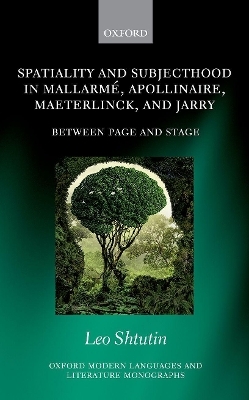
Spatiality and Subjecthood in Mallarmé, Apollinaire, Maeterlinck, and Jarry
Between Page and Stage
Seiten
2019
Oxford University Press (Verlag)
978-0-19-882185-4 (ISBN)
Oxford University Press (Verlag)
978-0-19-882185-4 (ISBN)
A comparative study that explores conceptualisations of spatiality and subjecthood in the works of Stéphane Mallarmé, Guillaume Apollinaire, Maurice Maeterlinck, and Alfred Jarry.
This study explores the interrelationship between spatiality and subjecthood in the work of Stéphane Mallarmé, Guillaume Apollinaire, Maurice Maeterlinck, and Alfred Jarry. Concerned with various modes of poetry and drama, it also examines the cross-pollination that can occur between these modes, focusing on a range of core texts including Mallarmé's Igitur and Un Coup de dés; Apollinaire's 'Zone' and various of his calligrammes; Maeterlinck's early one-act plays: L'Intruse, Les Aveugles, and Intérieur; and Jarry's Ubu roi and César-Antechrist.. The poetic and dramatic practices of these four authors are assessed against the broader cultural and philosophical contexts of the fin de siècle.
The fin de siècle witnessed a profound epistemological shift: the Newtonian-Cartesian paradigm, increasingly challenged throughout the nineteenth century, was largely dismantled, with ramifications beyond physics, philosophy, and psychology. Chapter 1 introduces three foundational notions—Newtonian absolute space, the unitary Cartesian subject, and subject-object dualism—that were challenged and ultimately overthrown in turn-of-the-century science and art. Developments in theatre architecture and typographic design are examined against this philosophical backdrop with a view to establishing a diachronic and interdisciplinary framework of the authors in question. Chapter 2 focuses on the spatial dimension of Mallarmé's Un Coup de dés and Apollinaire's calligrammes—works which defamiliarise page-space by undermining various (naturalised) conventions of paginal configuration. In Chapter 3, the notion of liminality is implemented in an analysis of character and diegetic space as constructed in Jarry's Ubu roi and Maeterlinck's one-acts. Chapters 4 and Chapter 5 undertake a more abstract investigation of parallel inverse processes-the subjectivisation of space and the spatialisation of the subject—manifest not only in the works of Mallarmé, Maeterlinck, Apollinaire, and Jarry, but in the period's poetry and drama more generally.
This study explores the interrelationship between spatiality and subjecthood in the work of Stéphane Mallarmé, Guillaume Apollinaire, Maurice Maeterlinck, and Alfred Jarry. Concerned with various modes of poetry and drama, it also examines the cross-pollination that can occur between these modes, focusing on a range of core texts including Mallarmé's Igitur and Un Coup de dés; Apollinaire's 'Zone' and various of his calligrammes; Maeterlinck's early one-act plays: L'Intruse, Les Aveugles, and Intérieur; and Jarry's Ubu roi and César-Antechrist.. The poetic and dramatic practices of these four authors are assessed against the broader cultural and philosophical contexts of the fin de siècle.
The fin de siècle witnessed a profound epistemological shift: the Newtonian-Cartesian paradigm, increasingly challenged throughout the nineteenth century, was largely dismantled, with ramifications beyond physics, philosophy, and psychology. Chapter 1 introduces three foundational notions—Newtonian absolute space, the unitary Cartesian subject, and subject-object dualism—that were challenged and ultimately overthrown in turn-of-the-century science and art. Developments in theatre architecture and typographic design are examined against this philosophical backdrop with a view to establishing a diachronic and interdisciplinary framework of the authors in question. Chapter 2 focuses on the spatial dimension of Mallarmé's Un Coup de dés and Apollinaire's calligrammes—works which defamiliarise page-space by undermining various (naturalised) conventions of paginal configuration. In Chapter 3, the notion of liminality is implemented in an analysis of character and diegetic space as constructed in Jarry's Ubu roi and Maeterlinck's one-acts. Chapters 4 and Chapter 5 undertake a more abstract investigation of parallel inverse processes-the subjectivisation of space and the spatialisation of the subject—manifest not only in the works of Mallarmé, Maeterlinck, Apollinaire, and Jarry, but in the period's poetry and drama more generally.
A graduate of Merton College, Oxford, Leo Shtutin is a freelance translator from Russian and French and has worked for online publications such as The Calvert Journal and Open Democracy. His translation of Death of a Prototype, a novel by the contemporary Russian author Victor Beilis, was published by Anthem Press in 2017 and nominated for the 2018 Read Russia Prize. Between Page and Stage is his first book.
Introduction
1: Space and Subject as Historically Contingent
2: Defamiliarising the Page
3: Staging the Liminal
4: Space Subjectivised
5: Spatialised Subjects
Conclusion
| Erscheinungsdatum | 10.04.2019 |
|---|---|
| Reihe/Serie | Oxford Modern Languages and Literature Monographs |
| Verlagsort | Oxford |
| Sprache | englisch |
| Maße | 149 x 222 mm |
| Gewicht | 430 g |
| Themenwelt | Geisteswissenschaften ► Sprach- / Literaturwissenschaft ► Anglistik / Amerikanistik |
| Geisteswissenschaften ► Sprach- / Literaturwissenschaft ► Literaturgeschichte | |
| Geisteswissenschaften ► Sprach- / Literaturwissenschaft ► Literaturwissenschaft | |
| ISBN-10 | 0-19-882185-9 / 0198821859 |
| ISBN-13 | 978-0-19-882185-4 / 9780198821854 |
| Zustand | Neuware |
| Haben Sie eine Frage zum Produkt? |
Mehr entdecken
aus dem Bereich
aus dem Bereich
Poetik eines sozialen Urteils
Buch | Hardcover (2023)
De Gruyter (Verlag)
59,95 €
Buch | Softcover (2024)
belleville (Verlag)
20,00 €


